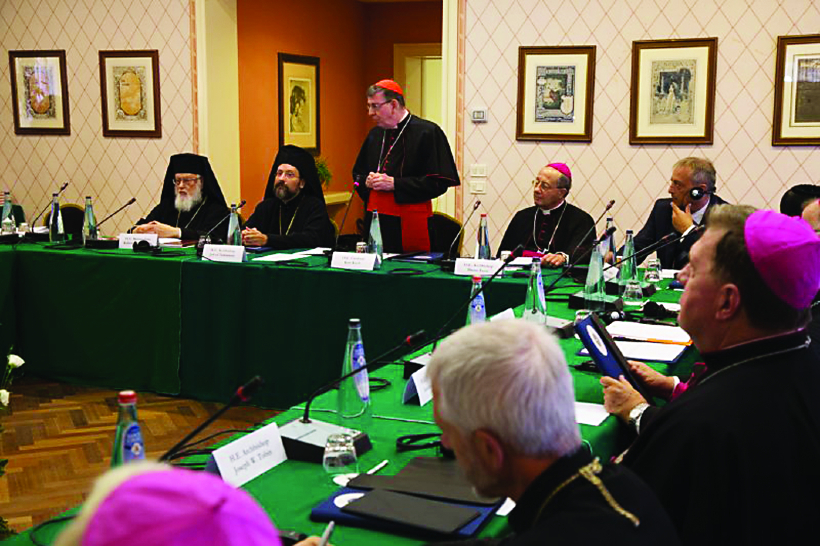The International Catholic-Orthodox Theological Dialogue – Part III
By Peter Anderson

Cardinal Koch during his speech at the plenary of the Joint International Commission for Theological Dialogue between the Orthodox and Catholic Churches, September 22, 2016, in Chieti, Italy
After the approval in 2007 of the Ravenna document on synodality and authority, the Joint International Commission for Theological Dialogue between the Orthodox and Catholic Churches (“Commission”) turned to the subject of the role of the Bishop of Rome in the first millennium. The Coordinating Committee of the Commission met on Crete in October 2008 and agreed on a text to be submitted to the next plenary of the Commission. However, before the next plenary, which was held in Paphos, Cyprus, in October 2009, the draft Crete document was leaked. Conservatives among the Orthodox were greatly upset by the document, and this created pressure on the Orthodox members of the Commission.
Compared to the harmonious meeting in Ravenna, the plenary in Cyprus was marked by strong criticism from the Orthodox side. It was possible only to review half of the Crete draft at this meeting, and a second meeting of the Commission was held in Vienna in September 2010. Although the atmosphere improved in Vienna, little progress was made in approving the document. At the end of the Vienna plenary, it was decided to put aside the Crete draft and to prepare a new document. Rather than taking the historical approached used in the Crete draft, the new document would focus on the theological and ecclesiological aspects of primacy in its relation to synodality. In November 2012 in Paris, the Coordinating Committee approved a draft of such a document, entitled Primacy and Synodality.
The plenary of the Commission met in Amman, Jordan, in September 2014. It soon became apparent that the new text using the theological approach would not be approved. A possible complicating factor was that nine months earlier the Holy Synod of the Moscow Patriarchate had ruled that primacy at the universal level only involves honor. In order to come up with something and not to have a complete failure, a group at the Amman plenary decided to draft on the spot a document that would again take the historical approach, but in a shorter and more limited way than the original Crete draft. Except for a few delegates at the plenary, this third document seemed to have general approval. The plenary therefore decided to refer the third document to the Coordinating Committee for further refinement.
Meeting in Rome in September 2015, the Coordinating Committee, including Metropolitan Hilarion (Moscow Patriarchate), approved the latest draft of the third document. The document, entitled Synodality and Primacy during the First Millennium, was then approved by the plenary of the Commission at its meeting at Chieti, Italy, in September 2016. The approved document was approximately one-half the length of the Crete document and far less detailed. Unlike the Crete document, it did not cause an uproar in the conservative wing of Orthodoxy. There was a sense of accomplishment as the Commission had finally approved a new document after nine years.
The Coordinating Committee is now working on two draft documents. The first document will assess the work of the Commission since its commencement in 1980 and will describe the work that needs to be done in the future. The second document will build on the Chieti document and will focus on synodality and primacy during the second millennium. The Coordinating Committee has already had two meetings to discuss the second document. Unfortunately, the Moscow Patriarchate has boycotted both meetings because of its dispute with the Ecumenical Patriarchate over Ukraine. A third meeting is scheduled for September 2020 in Rethymno, Crete. In ecumenical work, great patience is needed.
[Part I and Part II in this series are also available online here and here, respectively]






Facebook Comments